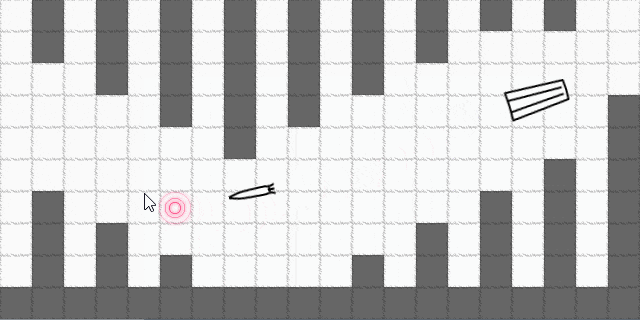This is a post about doing homing missiles in GameMaker!
Continue readingTag Archives: intermediate
GameMaker: Window sliding effects
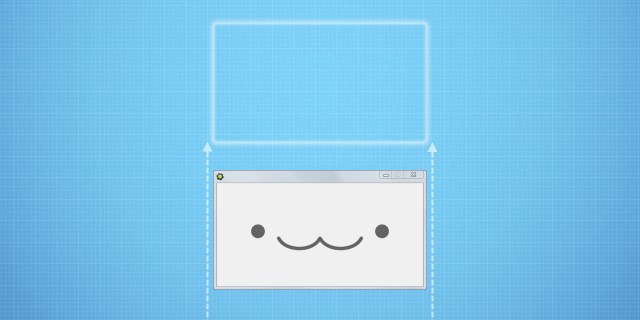
This post is about creating window sliding effect such as seen in my old program called GMConveter. Program itself was a bit of joke actually, since at the moment of it's publication the only actual difference between GM80 and GM81 formats was a version byte in file header, which GMConverter would change, making files compatible again. Not too bad of functional part for something that was downloaded over 4 thousand times over course of two years, right?
Apart from inner simplicity, it also had nice visuals, including a nice window sliding effect used on start and end of program. And that's what this article is about.
GameMaker: Recursive folder copying
In some situations you may want to copy a folder from your GameMaker game. And it would seem trivial but not that easy. file_copy can only copy files, and folder functions only allow you to create, check, and search folders for files. However, given these standard functions, implementing a folder copying routine is fairly easy.
Idea used here is to find a list of files and folders via file_find_*, and then go through them, checking whether they are files or folders, copying or recursively calling recursively function script accordingly. Sure that poses a potential problem if you were to copy entire disc contents to other location, but you are probably not going to be doing that via GameMaker... right?
Attached example contains the function and brief demonstration of functionality (you have to input source/destination paths as text).
Code follows,
Continue readingGameMaker: Basic 3d bone animations
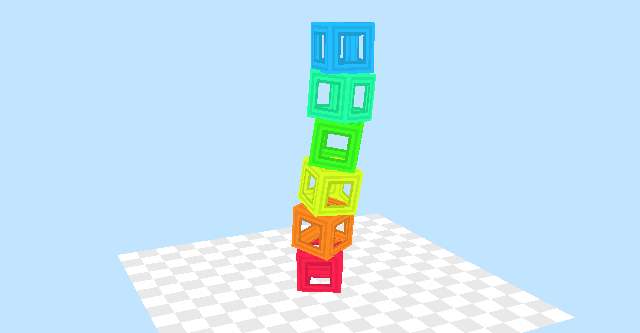
This example demonstrates how to create fairly basic bones for use in GameMaker 3d games fairly easily. Such can be used for character and environment animations, provided that they can be split in rotatable parts to some extent.
Advantages
As you may know, GameMaker does not quite support vertex animations. That means that models have to be either composed on-fly (which is a slow method), or "baked" as a number per-frame models (which takes amounts of memory proportional to how smooth you want your animations look). Bone animations, on other hand, work fast (since only transformation calculations need to be done), and require small amounts of memory.
Implementation
Idea of bone transformations is that you have so called bones, which can be attached to other bones, which makes them rotate together. That means, to find transformation matrix (position, rotation, and scale) of any given bone, you need to go through all of its "parent" bones, combining matrices. Normally this would be a slightly tricky task (especially if engine of choice does not have matrix operations built in), but, fortunately, GameMaker includes a set of functions to manipulate matrices (d3d_transform_).
Attached example includes a minimal system for linking bones together, drawing them, and a sort of procedural animation example.
GameMaker: Shadow casting in platformer games

This is a very old example of mine actually (creation timestamp says Sep 2010), which I've recently fixed & improved at request.
It demonstrates a simple algorithm to cast shadow from instance in platformer game. So when player jumps, shadow is displayed on ground below (realism!).
For the sake of simplicity and performance, shadows are checked against bounding boxes by default. Pixel-perfect checking is added as a separate condition, requiring affected objects to be children of obj_complex.
If you're interested in how this works behind-the-scenes, here's an illustration:
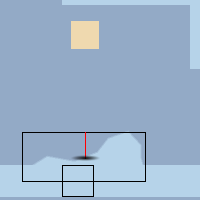
Outlined instances are ones used for finding top-most position below the player (which shadow will be cast onto). Red line is a number of point checks to indicate top-most point on objects with precise masks.
As another random visual tweak, there's a piece of code added to make shadow shrink as caster gets further from ground. A small touch, but these add up over time.
GameMaker – Substitution “cipher”

This example provides a function to substitute all characters in a string, which present in first set of characters, by characters from second set. This can be used to substitute l/e/a/s/t/o characters in a string by 1/3/4/5/7/0 accordingly, turning your "Hello World" into "H3110 W0r1d" in single script call, or to replace/swap characters with completely irrelevant ones, providing simple "encryption" (e.g. Caesar cipher or various substitution methods) to challenge the player.
Functional part is presented by a single script, named string_subst(string, from, to), which returns string with all characters from set from replaced by according characters from set to. As long as both from and to are of equal length and do not contain repeating characters, output can be "decrypted" by passing parameters in swapped order, e.g.
var asrc, adst, source, encr, decr; asrc = "0123456789"; // source "alphabet" adst = "3456789012"; // destination "alphabet" source = "51"; // source text encr = string_subst(source, asrc, adst); // "encrypted" text show_message(encr); // Displays "84;" decr = string_subst(encr, adst, asrc); // "decrypted" text show_message(decr); // Displays "51;"
Attached example demonstrates both "encryption" and "decryption", and has nice buttons.
Continue readingGameMaker: Cycling random funky text
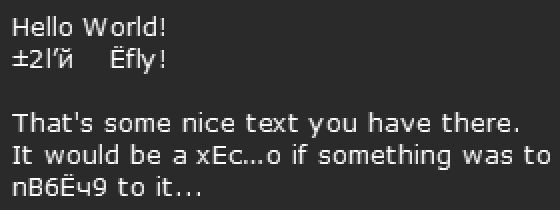
The idea behind this effect is simple enough - for every string character that should be randomized, replace it with any other character that has same width (so that the drawn string would not wiggle chaotically).
It uses 3 scripts total - one for general initialization, one for per-font init (creating a map of lists for what glyphs any given one could be replaced with), and one for actual string processing.
Can be handy for various abstract pieces, or as an interesting way to censor text.
Text versions follow,
Continue readingGameMaker: 3rd-person camera in 3d

This rather cute-looking example demonstrates creation of 3d-person camera in GameMaker' 3d. And character rotation. And a few other things.
Descriptions and explanations following,
GameMaker: keyboard_string, but with a caret

GameMaker has a built-in keyboard_string variable that lets you do simple text entry,
but what if you also want a caret
(so that the user can enter/erase text in the middle of the string)?
This is a post about that - a pretty reasonable input field.
Originally posted on Mar 16, 2013 (archive), revised in 2023.
Continue readingGameMaker: Jetpack platformer

